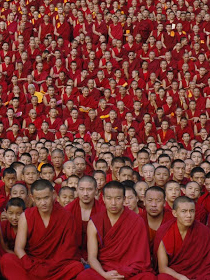- Home
- FPMT Homepage
Foundation for the Preservation of the Mahayana Tradition
The FPMT is an organization devoted to preserving and spreading Mahayana Buddhism worldwide by creating opportunities to listen, reflect, meditate, practice and actualize the unmistaken teachings of the Buddha and based on that experience spreading the Dharma to sentient beings. We provide integrated education through which people’s minds and hearts can be transformed into their highest potential for the benefit of others, inspired by an attitude of universal responsibility and service. We are committed to creating harmonious environments and helping all beings develop their full potential of infinite wisdom and compassion. Our organization is based on the Buddhist tradition of Lama Tsongkhapa of Tibet as taught to us by our founders Lama Thubten Yeshe and Lama Thubten Zopa Rinpoche.
- Willkommen
Die Stiftung zur Erhaltung der Mahayana Tradition (FPMT) ist eine Organisation, die sich weltweit für die Erhaltung und Verbreitung des Mahayana-Buddhismus einsetzt, indem sie Möglichkeiten schafft, den makellosen Lehren des Buddha zuzuhören, über sie zur reflektieren und zu meditieren und auf der Grundlage dieser Erfahrung das Dharma unter den Lebewesen zu verbreiten.
Wir bieten integrierte Schulungswege an, durch denen der Geist und das Herz der Menschen in ihr höchstes Potential verwandelt werden zum Wohl der anderen – inspiriert durch eine Haltung der universellen Verantwortung und dem Wunsch zu dienen. Wir haben uns verpflichtet, harmonische Umgebungen zu schaffen und allen Wesen zu helfen, ihr volles Potenzial unendlicher Weisheit und grenzenlosen Mitgefühls zu verwirklichen.
Unsere Organisation basiert auf der buddhistischen Tradition von Lama Tsongkhapa von Tibet, so wie sie uns von unseren Gründern Lama Thubten Yeshe und Lama Thubten Zopa Rinpoche gelehrt wird.
- Bienvenidos
La Fundación para la preservación de la tradición Mahayana (FPMT) es una organización que se dedica a preservar y difundir el budismo Mahayana en todo el mundo, creando oportunidades para escuchar, reflexionar, meditar, practicar y actualizar las enseñanzas inconfundibles de Buda y en base a esa experiencia difundir el Dharma a los seres.
Proporcionamos una educación integrada a través de la cual las mentes y los corazones de las personas se pueden transformar en su mayor potencial para el beneficio de los demás, inspirados por una actitud de responsabilidad y servicio universales. Estamos comprometidos a crear ambientes armoniosos y ayudar a todos los seres a desarrollar todo su potencial de infinita sabiduría y compasión.
Nuestra organización se basa en la tradición budista de Lama Tsongkhapa del Tíbet como nos lo enseñaron nuestros fundadores Lama Thubten Yeshe y Lama Zopa Rinpoche.
A continuación puede ver una lista de los centros y sus páginas web en su lengua preferida.
- Bienvenue
L’organisation de la FPMT a pour vocation la préservation et la diffusion du bouddhisme du mahayana dans le monde entier. Elle offre l’opportunité d’écouter, de réfléchir, de méditer, de pratiquer et de réaliser les enseignements excellents du Bouddha, pour ensuite transmettre le Dharma à tous les êtres. Nous proposons une formation intégrée grâce à laquelle le cœur et l’esprit de chacun peuvent accomplir leur potentiel le plus élevé pour le bien d’autrui, inspirés par le sens du service et une responsabilité universelle. Nous nous engageons à créer un environnement harmonieux et à aider tous les êtres à épanouir leur potentiel illimité de compassion et de sagesse. Notre organisation s’appuie sur la tradition guéloukpa de Lama Tsongkhapa du Tibet, telle qu’elle a été enseignée par nos fondateurs Lama Thoubtèn Yéshé et Lama Zopa Rinpoché.
Visitez le site de notre Editions Mahayana pour les traductions, conseils et nouvelles du Bureau international en français.
Voici une liste de centres et de leurs sites dans votre langue préférée
- Benvenuto
L’FPMT è un organizzazione il cui scopo è preservare e diffondere il Buddhismo Mahayana nel mondo, creando occasioni di ascolto, riflessione, meditazione e pratica dei perfetti insegnamenti del Buddha, al fine di attualizzare e diffondere il Dharma fra tutti gli esseri senzienti.
Offriamo un’educazione integrata, che può trasformare la mente e i cuori delle persone nel loro massimo potenziale, per il beneficio di tutti gli esseri, ispirati da un’attitudine di responsabilità universale e di servizio.
Il nostro obiettivo è quello di creare contesti armoniosi e aiutare tutti gli esseri a sviluppare in modo completo le proprie potenzialità di infinita saggezza e compassione.
La nostra organizzazione si basa sulla tradizione buddhista di Lama Tsongkhapa del Tibet, così come ci è stata insegnata dai nostri fondatori Lama Thubten Yeshe e Lama Zopa Rinpoche.
Di seguito potete trovare un elenco dei centri e dei loro siti nella lingua da voi prescelta.
- 欢迎 / 歡迎
简体中文
“护持大乘法脉基金会”( 英文简称:FPMT。全名:Foundation for the Preservation of the Mahayana Tradition) 是一个致力于护持和弘扬大乘佛法的国际佛教组织。我们提供听闻,思维,禅修,修行和实证佛陀无误教法的机会,以便让一切众生都能够享受佛法的指引和滋润。
我们全力创造和谐融洽的环境, 为人们提供解行并重的完整佛法教育,以便启发内在的环宇悲心及责任心,并开发内心所蕴藏的巨大潜能 — 无限的智慧与悲心 — 以便利益和服务一切有情。
FPMT的创办人是图腾耶喜喇嘛和喇嘛梭巴仁波切。我们所修习的是由两位上师所教导的,西藏喀巴大师的佛法传承。
繁體中文
護持大乘法脈基金會”( 英文簡稱:FPMT。全名:Found
ation for the Preservation of the Mahayana Tradition ) 是一個致力於護持和弘揚大乘佛法的國際佛教組織。我們提供聽聞, 思維,禪修,修行和實證佛陀無誤教法的機會,以便讓一切眾生都能 夠享受佛法的指引和滋潤。 我們全力創造和諧融洽的環境,
為人們提供解行並重的完整佛法教育,以便啟發內在的環宇悲心及責 任心,並開發內心所蘊藏的巨大潛能 — 無限的智慧與悲心 – – 以便利益和服務一切有情。 FPMT的創辦人是圖騰耶喜喇嘛和喇嘛梭巴仁波切。
我們所修習的是由兩位上師所教導的,西藏喀巴大師的佛法傳承。 察看道场信息:
- FPMT Homepage
- News/Media
-
- Study & Practice
-
-
- About FPMT Education Services
- Latest News
- Programs
- New to Buddhism?
- Buddhist Mind Science: Activating Your Potential
- Heart Advice for Death and Dying
- Discovering Buddhism
- Living in the Path
- Exploring Buddhism
- FPMT Basic Program
- FPMT Masters Program
- FPMT In-Depth Meditation Training
- Maitripa College
- Lotsawa Rinchen Zangpo Translator Program
- Universal Education for Compassion & Wisdom
- Online Learning Center
-
- Prayers & Practice Materials
- Overview of Prayers & Practices
- Full Catalogue of Prayers & Practice Materials
- Explore Popular Topics
- Benefiting Animals
- Chenrezig Resources
- Death & Dying Resources
- Lama Chopa (Guru Puja)
- Lama Zopa Rinpoche: Compendium of Precious Instructions
- Lama Zopa Rinpoche: Life Practice Advice
- Lama Zopa Rinpoche Practice Series
- Lamrim Resources
- Mantras
- Prayer Book Updates
- Purification Practices
- Sutras
- Thought Transformation (Lojong)
- Audio Materials
- Dharma Dates - Tibetan Calendar
- Translation Services
- Publishing Services
- Ways to Offer Support
- Prayers & Practice Materials
-
- Teachings and Advice
- Find Teachings and Advice
- Lama Zopa Rinpoche Advice Page
- Lama Zopa Rinpoche: Compendium of Precious Instructions
- Lama Zopa Rinpoche Video Teachings
- ༧སྐྱབས་རྗེ་བཟོད་པ་རིན་པོ་ཆེ་མཆོག་ནས་སྩལ་བའི་བཀའ་སློབ་བརྙན་འཕྲིན།
- Podcasts
- Lama Yeshe Wisdom Archive
- Buddhism FAQ
- Dharma for Young People
- Resources on Holy Objects
- Teachings and Advice
-
-
*If a menu item has a submenu clicking once will expand the menu clicking twice will open the page.
-
-
- Centers
-
- Teachers
-
- Projects
-
-
-
-
*If a menu item has a submenu clicking once will expand the menu clicking twice will open the page.
-
-
- FPMT
-
- Shop
-
-
-
The Foundation Store is FPMT’s online shop and features a vast selection of Buddhist study and practice materials written or recommended by our lineage gurus. These items include homestudy programs, prayers and practices in PDF or eBook format, materials for children, and other resources to support practitioners.
Items displayed in the shop are made available for Dharma practice and educational purposes, and never for the purpose of profiting from their sale. Please read FPMT Foundation Store Policy Regarding Dharma Items for more information.
-
-
16
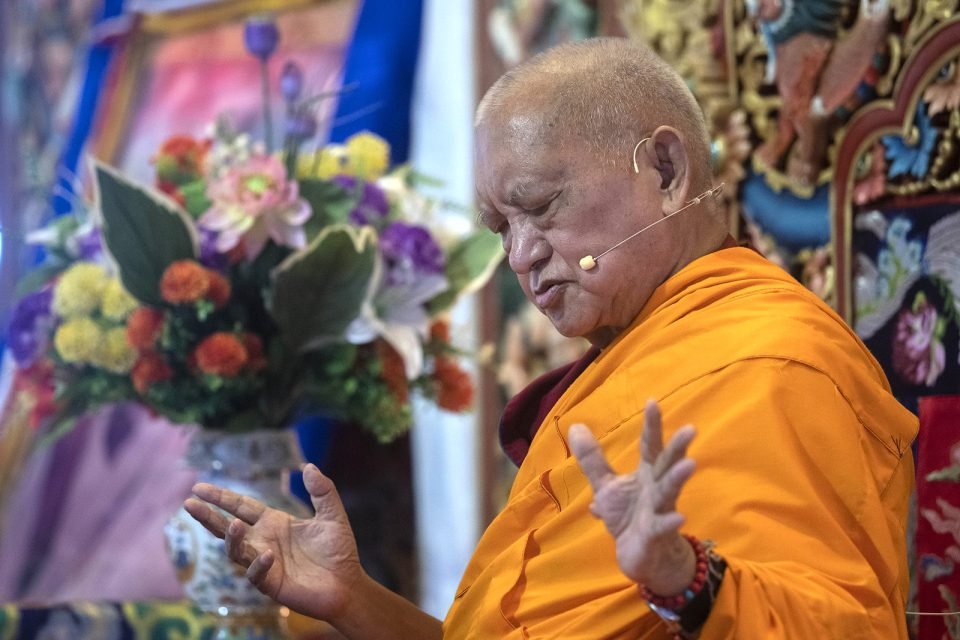
Rinpoche giving teachings at Khachoe Ghakyil Ling, Nepal, October 2021. Photo by Ven. Lobsang Sherab.
Since our last update, Lama Zopa Rinpoche has remained in Nepal and has been offering two ongoing teaching events. Rinpoche also celebrated Lhabab Duchen, gave advice via video at the fortieth anniversaries of two FPMT centers, and engaged in many other beneficial activities. We invite you to enjoy some of the details of Rinpoche’s compassionate service to others!
Rinpoche Offers Teachings
Rinpoche continued his video thought transformation teachings during this time, offering teachings for ordained Sangha and also extensive teachings on Buddhist refuge. In Rinpoche’s refuge teachings he warns that we must be careful about the objects in which we take refuge. For example, people take refuge in animals, nature, or spirits, but none of these have the qualities of the Buddha or can offer us ultimate refuge—freedom from samsara. Rinpoche also discussed depression, explaining that to understand the mental states of others we first have to understand our own craziness. Then, when we think of others, we will be able to more easily develop compassion.
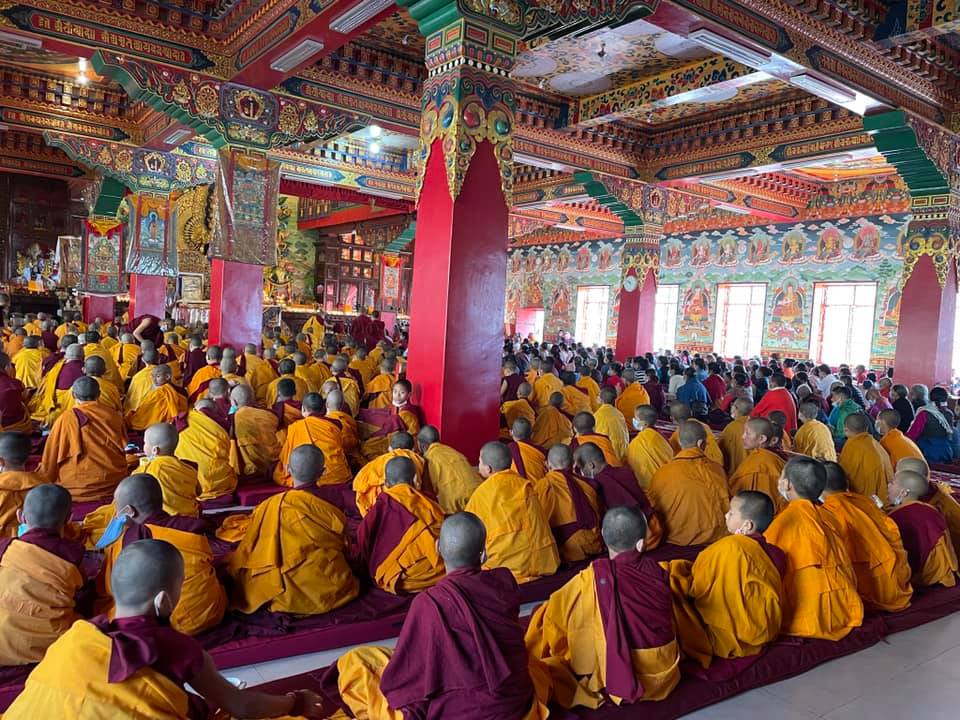
Lama Zopa Rinpoche teaching at Khachoe Ghakyil Ling, Nepal. Photo by Ven. Sarah Thresher.
Rinpoche has been offering regular teachings at Khachoe Ghakyil Ling, also known as the Kopan Nunnery, for the past three weeks. These teachings are being translated into Nepali from Tibetan, providing a rare opportunity for Nepali people to have access to Rinpoche’s teachings in their own language. These teachings are available on the FPMT Tibetan YouTube channel. Half in attendance at the teachings are nuns and half are people from outside the nunnery. Topics taught include what is and is not holy Dharma, the eight worldly dharmas, the preciousness of this human rebirth, karma, proper motivation, the importance of a good heart, and the kindness of the enemy. Rinpoche offered a White Tara jenang and the oral transmission of the Vajra Cutter Sutra. The teaching series will end with a Medicine Buddha initiation.
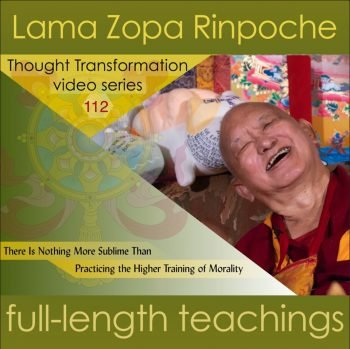
A recent podcast episode.
“Of all practices, the practice of kindness is best,” Rinpoche emphasized during these teachings. “Of all forms of education, the best education is how to be a kind person. Parents should teach their children to have a kind heart from a young age. That will help them the most when they grow up. It will help their friends, their neighborhood, their town, their country, the world.”
A new podcast series featuring full-length teachings by Lama Zopa Rinpoche was recently launched. Each episode corresponds to a new video in the ongoing series of Rinpoche’s thought transformation teachings. Episodes are released shortly after the latest video teaching and blog are published, so listeners have access to the transcript and other materials associated with a specific teaching. For the podcast episodes, pauses have been shortened and background noise reduced, but otherwise the teachings are unedited. Currently we have podcast episodes for Rinpoche’s video teachings from July 2021 onward (videos 102–123).
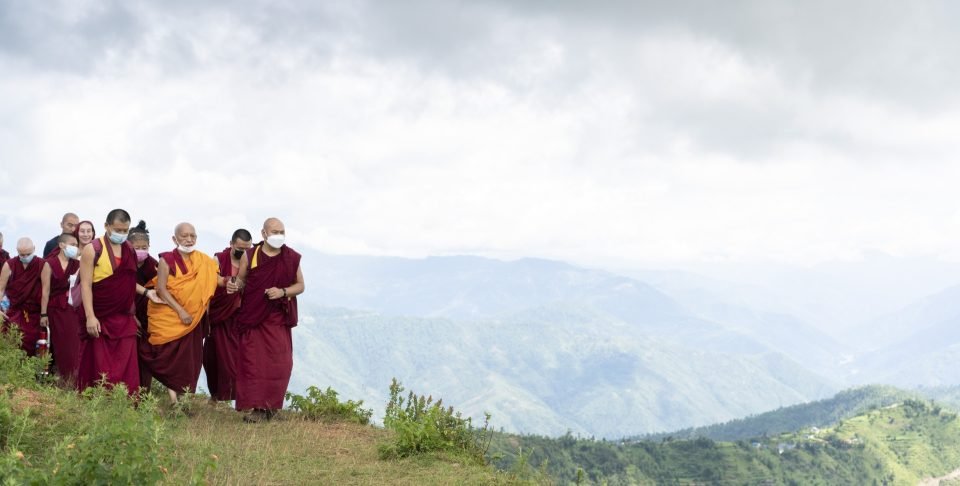
Lama Zopa Rinpoche walking to offer puja on the land in Maratika where the giant Padmasambhava statue will be built, Nepal, September 2021. Photo by Ven. Lobsang Sherab.
Rinpoche Travels to Maratika
In September 2021, Rinpoche returned to Maratika along with Kopan lama gyupas monks and nuns to bless the land where a 45-foot (14-meter) tall statue of Padmasambhava (Guru Rinpoche) on a 15-foot (4.5-meter) tall throne will be built. The statue will be in the aspect of Padma Gyalpo, Padmasambhava’s magnetizing form, and will be made of bronze and plated with gold. It is expected to take around five years to complete. During this visit, Rinpoche spent time meeting with some local people, including the mayor of Maratika. He offered teachings to two hotel owners. He also blessed the goats in Maratika liberated for his long life, gave two online Zoom teachings, and visited the main cave, which was opened only for Rinpoche, to make special prayers at the long life vase.
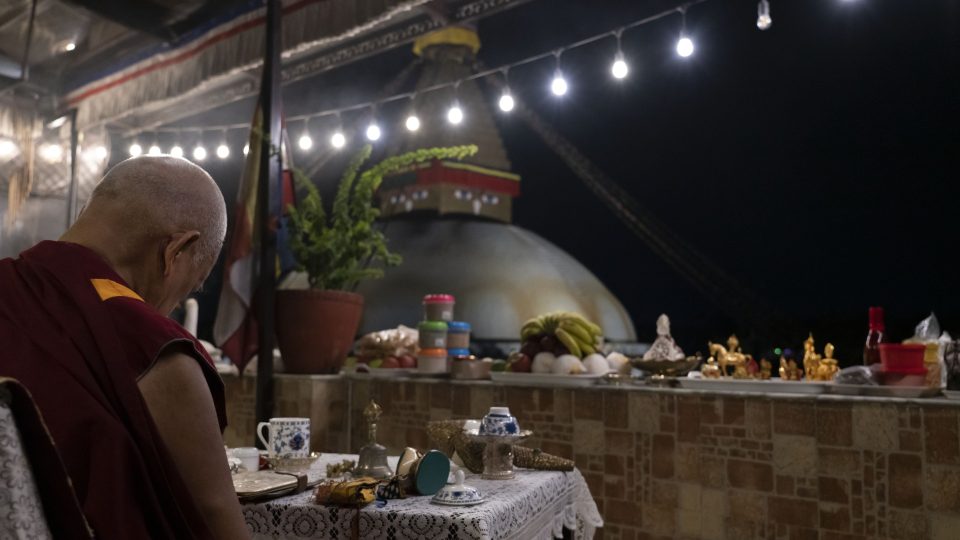
Lama Zopa Rinpoche offering puja in front of Boudhanath Stupa, Nepal, October 15, 2021. Photo by Ven. Lobsang Sherab.
Rinpoche Circumambulates and Makes Offerings to Stupas
While Rinpoche is in Nepal, he frequently goes to visit the great stupas of Boudhanath and Swayambhunath to circumambulate and make offerings and prayers. Sometimes Rinpoche goes in the evenings, sometimes after teachings, sometimes on the way back from trips in Kathmandu or other places.
When Rinpoche goes to Boudha Stupa he usually does korwa while reciting the mantras that increase the power of making circumambulation. Students in attendance join in as Rinpoche recites out loud In Praise of Dependent Origination by Lama Tsongkhapa, followed by several repetitions of the Confession of Downfalls to the Thirty-five Buddhas and Vajrasattva mantra to purify. At the end of the circumambulations, Rinpoche leads a group offering of five-colored khatas to the stupa and dedication prayers. During the circumabulations, Rinpoche also likes to offer incense and rice visualized as wish-granting jewels, bless the dogs, and turn the prayer wheels.
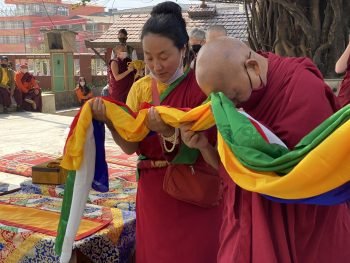
Lama Zopa Rinpocha and Khadro-la offering five-colored khata at Swayambhunath Stupa on Lhabab Duchen. Photo by Ven. Roger Kunsang.
When Rinpoche goes to Swayambhunath, he circumambulates around the base of the hill. As Rinpoche circumambulates, he recites prayers, offers rice visualized as wish-granting jewels, and rejoices for all those who helped construct the many prayer wheels and stupas that encircle the hill. Rinpoche stops at a special Padmasambhava statue to chant prayers and pray for His Holiness the Dalai Lama and Tibet. Rinpoche also stops at the local cremation grounds to recite prayers for those who have recently died and whose corpses are being burned.
On Lhabab Duchen Rinpoche offered pujas, prayers, and five-colored khatas with Khadro-la (Rangjung Neljorma Khandro Namsel Drönme) at Swayambunath. You can read more about the activities sponsored during this merit-multiplying Buddha day.
Winter Debates at Kopan
Monks have held the Jang Guncho, the winter debate festival, for centuries. The first Nuns’ Jang Guncho took place in Dharamsala, India, in 1995. Jang Guncho is an opportunity for ordained Sangha to gather together to train in and practice debate. Lama Zopa Rinpoche attended the winter debates of both Kopan Monastery and Khachoe Ghakyil Ling early this October.
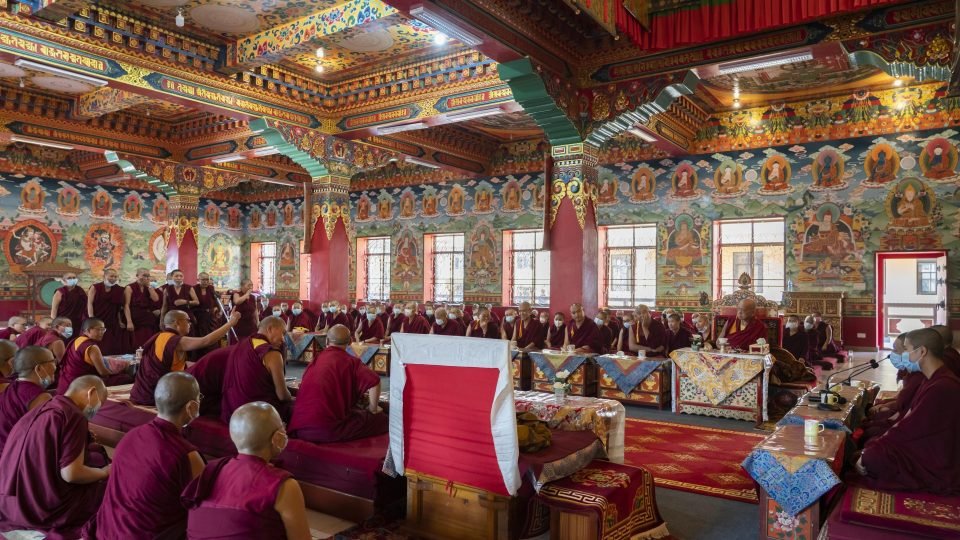
Lama Zopa Rinpoche attending the winter debate of the nuns of Khachoe Ghakyil Nunnery, Nepal, October 11, 2021. Photo by Ven. Lobsang Sherab.
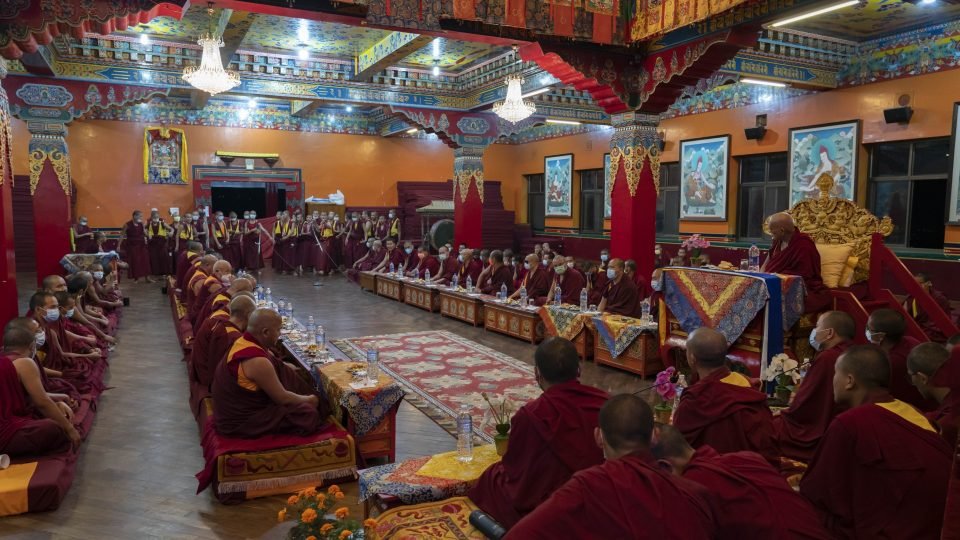
Lama Zopa Rinpoche attending the winter debate of the monks of Kopan Monastery, Nepal, October 8, 2021. Photo by Ven. Lobsang Sherab.
Rinpoche Offers Encouragement and Advice during the Fortieth Anniversary Celebrations of Two FPMT Centers
Nalanda Monastery, the FPMT monastery in the south of France, has been celebrating its fortieth anniversary this year. In October, Rinpoche offered the Nalanda community an encouraging and joyful talk from Kopan Monastery, urging everyone to meditate strongly on impermanence and death in order to change worldly dharma into holy Dharma. Rinpoche also praised those who are Sangha in the West, explaining that they are the “real heroes” due to the “incredible renunciation” of becoming ordained.
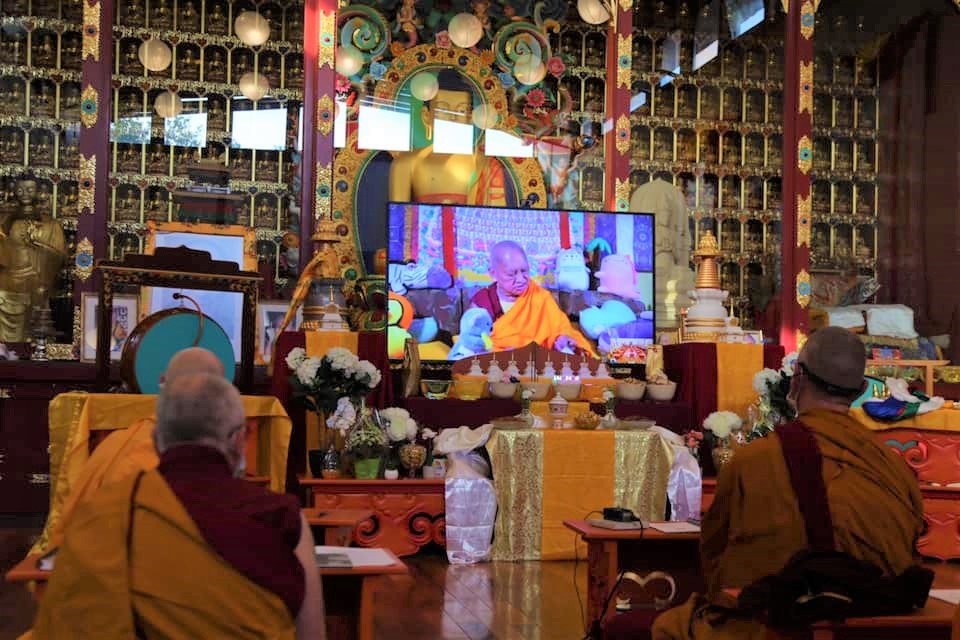
Lama Zopa Rinpoche offering a talk to the Nalanda Monastery community, France, October 18, 2021. Photo courtesy of Nalanda Monastery’s Facebook page.
Buddha House, an FPMT center located in a suburb of Adelaide, South Australia, also celebrated its fortieth anniversary this year. In October, Rinpoche offered a teaching via video on the importance of FPMT centers and on emptiness. “You can see how it is most important for the center to exist!” Rinpoche said. “[Centers share] Lama Tsongkhapa teachings, Buddha’s teachings. [Centers create] an opportunity for sentient beings to study, to learn with no mistakes! Thank you very much!” We look forward to sharing video of this teaching with you and a summary of the main points Rinpoche expressed. (Extensive advice from Rinpoche is always available on the benefits of offering service as well as on the benefits of centers and the FPMT Organization. See Rinpoche’s Advice page.)
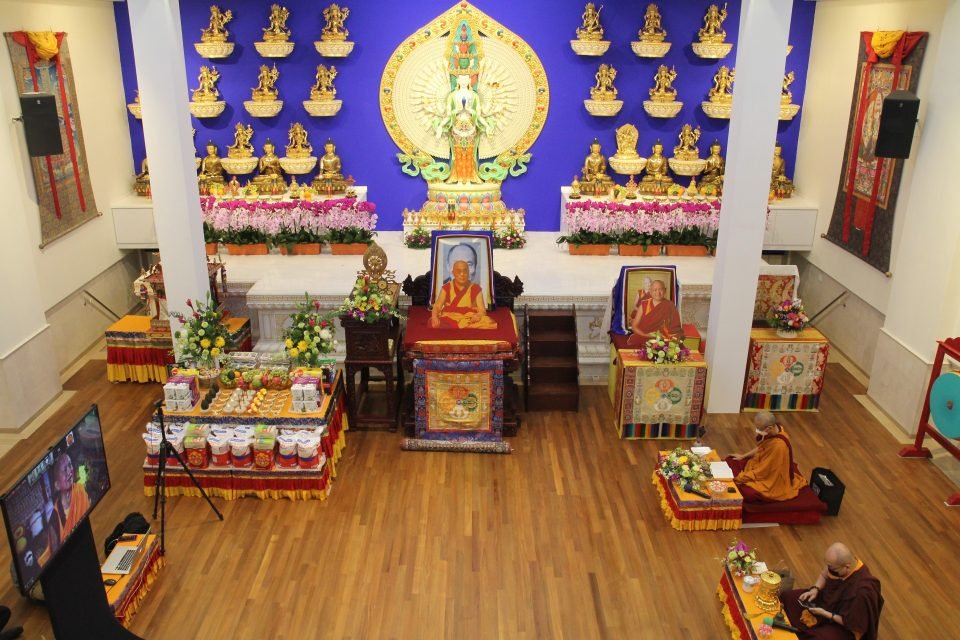
Thousand-Arm Chenrezig statue and Twenty-one Tara statues at Amitabha Buddha Centre with image of Lama Zopa Rinpoche offering a talk via video, Singapore. Photo courtesy of ABC.
Twenty-one Tara Statues Consecration at Amitabha Buddhist Centre
In 1995, Lama Zopa Rinpoche advised Amitabha Buddhist Centre (ABC) in Singapore to buy land and build on it a dedicated temple that has as its central image Thousand-arm Chenrezig surrounded by the Twenty-one Taras. The land was bought in 1998. Construction began in 2003. And in 2007, the center opened its doors. The Thousand-arm Chenrezig statue was completed in 2016. And this year, the Twenty-one Tara statues were completed and consecrated on October 27.
ABC organized a celebratory event for the consecration, which was broadcast live over several online platforms with translations offered in seven languages. Lama Zopa Rinpoche did the consecration of the statues via Zoom from Kopan Monastery. He also gave a teaching and made strong prayers for the statues to be of great benefit to sentient beings. Nine hundred people joined via Zoom with a thousand others joining on Facebook Live. Center Director Tan Hup Cheng offered an opening speech for the event. There was a short video of how the statues were made in Nepal and installed on the altar. Khenrinpoche Geshe Chonyi, ABC’s resident teacher, unveiled the statues. Ven. Sangye Khadro and Ven. Thubten Chodron shared congratulatory messages via video, including a moving prayer to Tara, which had been translated by Lama Yeshe from the Cittamani Tara long sadhana. The program ended with extensive dedications. We are pleased to share video of this auspicious event. A complete transcript of this teaching, as well as more photos and details of the event will be shared in the near future.
Please Enjoy New Photos of Rinpoche’s Recent Activities
Please join us in rejoicing in all of Rinpoche’s beneficial activities for others! We have created a new photo album of Rinpoche, including many activities we didn’t mention above, which we invite you to enjoy.
Visit the September–October 2021 photo album:
https://fpmt.org/teachers/zopa/gallery/nepal-september-october-2021/
Lama Zopa Rinpoche is the spiritual director of the Foundation for the Preservation of Mahayana Tradition (FPMT), a Tibetan Buddhist organization dedicated to the transmission of the Mahayana Buddhist tradition and values worldwide through teaching, meditation and community service.
Watch the video series Lama Zopa Rinpoche’s Teachings on Thought Transformation during the Time of COVID-19 and find links to videos in transcripts, MP3s, additional practice advice, and more:
https://fpmt.org/fpmt/announcements/resources-for-coronavirus-pandemic/advice-from-lama-zopa-rinpoche-for-coronavirus/
- Home
- News/Media
- Study & Practice
- About FPMT Education Services
- Latest News
- Programs
- New to Buddhism?
- Buddhist Mind Science: Activating Your Potential
- Heart Advice for Death and Dying
- Discovering Buddhism
- Living in the Path
- Exploring Buddhism
- FPMT Basic Program
- FPMT Masters Program
- FPMT In-Depth Meditation Training
- Maitripa College
- Lotsawa Rinchen Zangpo Translator Program
- Universal Education for Compassion & Wisdom
- Online Learning Center
- Prayers & Practice Materials
- Overview of Prayers & Practices
- Full Catalogue of Prayers & Practice Materials
- Explore Popular Topics
- Benefiting Animals
- Chenrezig Resources
- Death & Dying Resources
- Lama Chopa (Guru Puja)
- Lama Zopa Rinpoche: Compendium of Precious Instructions
- Lama Zopa Rinpoche: Life Practice Advice
- Lama Zopa Rinpoche Practice Series
- Lamrim Resources
- Mantras
- Prayer Book Updates
- Purification Practices
- Sutras
- Thought Transformation (Lojong)
- Audio Materials
- Dharma Dates – Tibetan Calendar
- Translation Services
- Publishing Services
- Teachings and Advice
- Find Teachings and Advice
- Lama Zopa Rinpoche Advice Page
- Lama Zopa Rinpoche: Compendium of Precious Instructions
- Lama Zopa Rinpoche Video Teachings
- ༧སྐྱབས་རྗེ་བཟོད་པ་རིན་པོ་ཆེ་མཆོག་ནས་སྩལ་བའི་བཀའ་སློབ་བརྙན་འཕྲིན།
- Podcasts
- Lama Yeshe Wisdom Archive
- Buddhism FAQ
- Dharma for Young People
- Resources on Holy Objects
- Ways to Offer Support
- Centers
- Affiliates Area
- Teachers
- Projects
- Charitable Projects
- Make a Donation
- Applying for Grants
- News about Projects
- Other Projects within FPMT
- Support International Office
- Projects Photo Galleries
- Give Where Most Needed
- FPMT
- Shop
Translate*
*powered by Google TranslateTranslation of pages on fpmt.org is performed by Google Translate, a third party service which FPMT has no control over. The service provides automated computer translations that are only an approximation of the websites' original content. The translations should not be considered exact and only used as a rough guide.Approaching enlightenment is a gradual process, but once you attain it, there’s no going back; when you reach the fully awakened state of mind, the moment you experience that, you remain enlightened forever.







